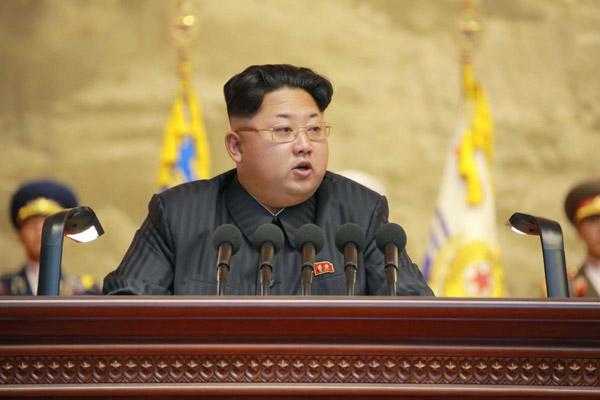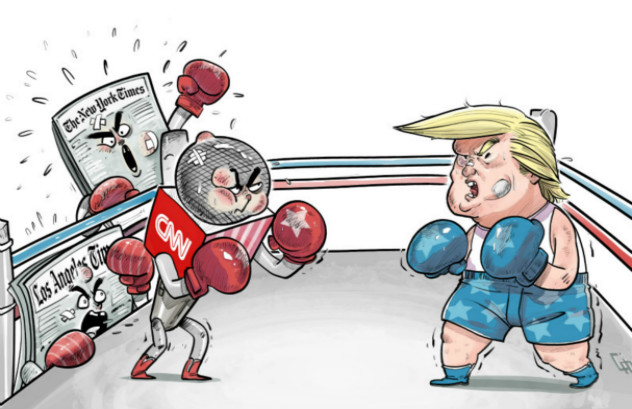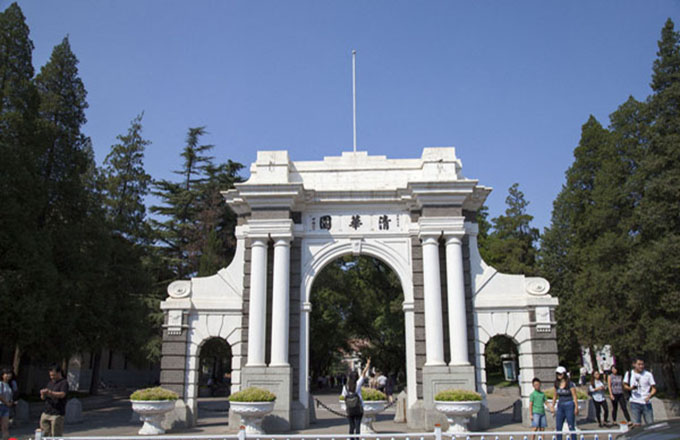Nuclear deterrence will not bring DPRK security: Opinion
 |
|
Photo provided by Korean Central News Agency (KCNA) on July 26, 2015 shows top leader of the Democratic People's Republic of Korea (DPRK) Kim Jong-un making a congratulatory speech at the 4th National Conference of War Veterans on July 25, 2015. [Photo/Xinhua/KCNA] |
The unexpected announcement by the Democratic People's Republic of Korea that it had successfully tested its first hydrogen bomb will not only deal a huge blow to the already unpredictable process for denuclearizing the Korean Peninsula, but also intensify tensions in Northeast Asia.
It is still too early to confirm whether it was truly a hydrogen bomb test, because hydrogen bombs require sophisticated technology which many believe the DPRK does not possess.
However, the DPRK's nuclear test, its fourth since 2006, resulted in a 5.1 magnitude earthquake near Sungjibaegam, which should set alarm bells ringing about Pyongyang's growing nuclear capability.
The test seems to be a response to the West's doubts about Pyongyang's capacity to make a hydrogen bomb after DPRK leader Kim Jong-un claimed it had the capability in December. By drawing global attention with the test, the DPRK has once again called on the world to seriously address its security concerns.
On Tuesday, the official Korean Central News Agency released a commentary on the basic factor that compelled the DPRK to bolster its nuclear deterrence, saying "the US had already worked out a nuclear plan to bomb major cities and regions of socialist countries, including major cities in the DPRK, back in the mid-1950s".
The long-time appeal by the DPRK to sign a peace treaty with the United States to formally end the Korean War (1950-53) has been ignored by the US. But that should not be an excuse for the DPRK to resort to using nuclear deterrence to seek security, because among other things it poses a serious challenge to China's border security and endangers peace and stability on the Korean Peninsula.
China, as a responsible power, is always making efforts to resume the Six-Party Talks, in order to peacefully resolve the DPRK nuclear issue. It should not bear the brunt of the deadlock between the US and the DPRK.
China supported the sanctions against the DPRK after the latter conducted its third nuclear test in 2013, clearly showing its strong opposition to Pyongyang carrying out nuclear tests. The fourth nuclear test on Wednesday will no doubt raise new challenges for the already cooling China-DPRK ties. Beijing has always cherished its ties with Pyongyang, but the DPRK needs to make real efforts to maintain good relations with its neighbor, for instance, by helping guarantee China's border security, rather than making it difficult.
But it would be extremely wrong for the US to think it can just stand by and exploit the rifts between China and the DRPK. Given the growing nuclear capability of the DPRK, it could miniaturize its nuclear weapons and eventually arm its missiles with nuclear warheads posing a threat to the US. The Republic of Korea, an ally of the US, will pay a heavy price for the DPRK's nuclear deterrence.
For the DPRK, its dangerous nuclear moves will not bring peace as it expects. Instead, it could mount pressure on those countries to take an even harder stance toward the DPRK, which will only worsen its ties with them. What’s worse, it will give Uncle Sam a perfect excuse to strengthen its military buildup in Northeast Asia, and may escalate tensions further.
It's high time related countries resumed the Six-Party Talks, because that is the only way to end the deadlock.
- DPRK says it has successfully carried out 1st hydrogen bomb test
- M4.9 shallow earthquake detected in DPRK: Chinese seismological agency
- DPRK test-fires sub-launched ballistic missile in December
- President of the ROK says door open to dialogue with DPRK
- DPRK senior party official Kim Yang Gon killed in car accident



















